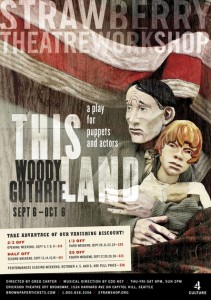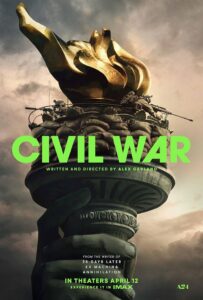 The Erickson Theater sits behind Seattle Central Community College on Harvard Avenue. This is a tiny theater in size but a giant theater in terms of talent. As I sat down in the very front row, I was entertained with the Lead Belly version of “Where Did You Sleep Last Night.” Then the music faded and the play began with a guitarist with harmonica singing “Pastures of Plenty.” When the spotlight faded from the guitarist, it shone on the other side of the stage to a woman manipulating a life-sized puppets dressed in depression-era clothing, complete with the lines of hard times carved on their faces while they sang “The Biggest Thing That Man Has Ever Done.”
The Erickson Theater sits behind Seattle Central Community College on Harvard Avenue. This is a tiny theater in size but a giant theater in terms of talent. As I sat down in the very front row, I was entertained with the Lead Belly version of “Where Did You Sleep Last Night.” Then the music faded and the play began with a guitarist with harmonica singing “Pastures of Plenty.” When the spotlight faded from the guitarist, it shone on the other side of the stage to a woman manipulating a life-sized puppets dressed in depression-era clothing, complete with the lines of hard times carved on their faces while they sang “The Biggest Thing That Man Has Ever Done.”
The play, simply titled This Land/Woody Guthrie, is dubbed a play for actors and puppets. The entire production switched between puppets and actors to musicians and singers who would either recite Guthrie’s prose or perform his songs. At one point a miniature female puppet stood in a suitcase that was made up to look like the interior of her home while she sang “So Long It’s Been Good To Know You,” a song about the Oklahoma dust storms. As she sang, an actor slowly poured sand into her “home.”
Guthrie’s prose was also alternately performed by actors and puppets, many of which were life-sized and looked eerily like 1930s people. There were recitings of Guthrie’s talk of the dust storms that sent so many Oklahoma citizens to California and how a few bought up the orchards and allowed the fruit to rot on the ground instead of giving it to the many who were going hungry. Shortly after, a hauntingly beautiful rendition of the song “Deportees” was performed.
A scene was played out of Woody’s arrival with Pete Seeger to Seattle in 1941 where they performed as part of the Almanac Singers. A re-creation of the Almanac Singers was presented with a resounding rendition of “All You Fascists Born To Lose.”
The finale was a retelling of the inspiration of “This Land Is Your Land” and how the song was inspired by the Irving Berlin song “God Bless America.” Apparently Woody got sick of traveling the country and hearing that song wherever he went. He was incensed that the song simply distracted people from the real issues of the world, telling them not to worry about a thing, that God would take care of them. “This Land Is Your Land” was Guthrie’s response to the Irving Berlin song. As “This Land Is Your Land” was sung, then faded, a recording of “God Bless America” was piped through the theater by a female singer who sounded like it was probably Ronnie Gilbert singing. It was a beautiful rendition and made the otherwise banal song sound stunning.
Then, the whole show was over. I sat, wanting more. I didn’t want the production to end. The sets of stacked, old fashioned trunks and suitcases, along with the props and the puppetry, were nothing less than spectacular. The musicians played everything from guitar, harmonica, piano, fiddle, and stand-up bass. There was often up to five-part harmony. As I sat and watched it pained me to think that we are still fighting the same issues today that Woody Guthrie was fighting back in the thirties and forties and fifties. We still have a few hoarding the wealth while many others lost their homes and jobs. We are still fighting voter suppression and we still have the powers that be trying to distract us with the latest “shiny thing.” We need another Woody Guthrie to travel the country singing these protest songs. The music broadcast over commercial airwaves these days is nothing less than something that was designed to turn our brains to mush. The protest songs are only played on non-commercial radio with so little wattage that they only reach a small audience. Those protesting in the Occupy Movement suffered tremendous police brutality, just as Woody experienced in his day for protesting the same things the Occupy Movement protests today. I sat and marveled at how little things have changed.
The second half of the play begins with the entire cast performing This Land Is Your Land complete with two guitars, a stand-up bass, a fiddle, and a banjo. In all, a total of twelve people are singing. It all seems very joyous until sound bites of news broadcasts filter through about the horrific death of Matthew Shepard while in the corner opposite the singers a dark colored and life-sized puppet has been “lynched.” It hangs from a branch, noose around its neck in a dark corner of the stage. The music has been replaced by a haunting female voice with piano accompaniment as the body is removed from the noose and gently wrapped before being taken away. A male and female actor enter. The male introduces himself as Woody Guthrie. The woman is speaking her mind about how outraged she is that people make such a deal about the color of someone’s skin. Two more actors begin simultaneously reciting news reports of two different factory fires where workers were trapped inside. One was the Triangle Shirt Factory of 1911 and the other, a food processing plant in North Carolina in 1991. In both cases fire exits were blocked resulting in the deaths of many of the workers (146 for the Triangle Factory and 25 for the processing plant.) Three mining puppets emerged, sifting through rubble while talks of the use of child labor in the mines revealed that boys as young as ten worked as many as sixteen hours straight for a pay of sixty cents. Beyond the miners is a large gate where the wives and children (again, puppets) of the miners wait for news about their husband/father after an explosion at the mine. Woody’s song Waiting At the Gate is sung:
Tell the miners’ kids and wives,
There’s a blast in the number five.
And the families I see standing at the gate.
The inspector years ago said number five’s a deadly hole,
And the men most likely won’t come out alive.
Waiting at the gate, we are waiting at the gate.
Smoke and fire just roll and boil from that dark and deadly hole,
While the miners’ kids and wives wait at the gate.
This scene melds into The Jolly Banker:
If you show me you need it, I’ll let you have credit, I’m a jolly banker, jolly banker am I. Just bring me back two for the one I lend you, Singin’ I’m jolly banker, jolly banker am I.
When your car you’re losin’, and sadly your cruisin’, I’m a jolly banker, jolly banker am I. I’ll come and foreclose, get your car and your clothes, Singin’ I’m jolly banker, jolly banker am I.
On a screen at the back of the stage, pictures of modern day “jolly bankers” such as Goldman Sachs, Lehman Bros. Chase Morgan, Wells Fargo, to name but a few are flashed one after another and surrounded by a Monopoly board border.
The puppets not only looked human, they were manipulated in such a way that they seemed to show emotion. During one scene a puppet of an elderly woman lies on a bed with an elderly gentleman sitting next to her bedside. He tenderly strokes her hair until she passes away. No words are spoken, but the male puppet rests his head on the woman after she’s covered up, his body trembling with grief. The scene was so poignant I wanted to cry along with him.
At the very end and actress recited some of Woody’s prose while pictures of Woody, many of him with his children, flashed on the screen.
If there’s one complaint, and it’s a teeny weeny one, it’s that some of the symbolism was lost on me. But then I’ve never been very good at symbolism anyway, so who am I to judge. This is a ten star play out of ten. I would go so far as to give it twenty out of ten. For anyone who lives near Seattle, I deplore you to go see this play. It is nothing less than spectacular and it sticks with you long after you’ve gone home. The most disturbing aspect of this play is that the wrongs Woody sang about in the thirties and forties are still happening today. Workers’ rights are still being trampled on, wages are still low while the “boss man” hoards all the profits and the “banker man” is still lending out money and then foreclosing on homes. If you’re a Woody Guthrie fan, honor what he sang about, or just someone who fights the good cause, go see this play.
This Land/Woody Guthrie is playing through October 6 and I cannot recommend it enough. If anyone reading this lives within fifty miles of Central Seattle, I strongly urge you to see this play. You will not be disappointed.
This Land | Woody Guthrie
Erickson Theatre Off Broadway
September 6- October 6, 2012
Performs Thu-Fri-Sat at 8pm
Sunday matinees at 2pm
*no performance Sunday October 7
adapted and directed by Greg Carter
from the drawing, writing, and music of Woody Guthrie
performed by
Michael Adams
Rob Burgess
Sheila Daniels
Amy Fleetwood
Edd Key
Don Darryl Rivera
Bhama Roget
Charlie Sandford
Clark Sandford
Margaret Savas
Katherine Stromberger
Kayla Walker
designed and constructed by
Jessica Trundy
Katherine Stromberger
Evan Mosher
Ron Erickson
Greg Carter
Gabrielle Strong


